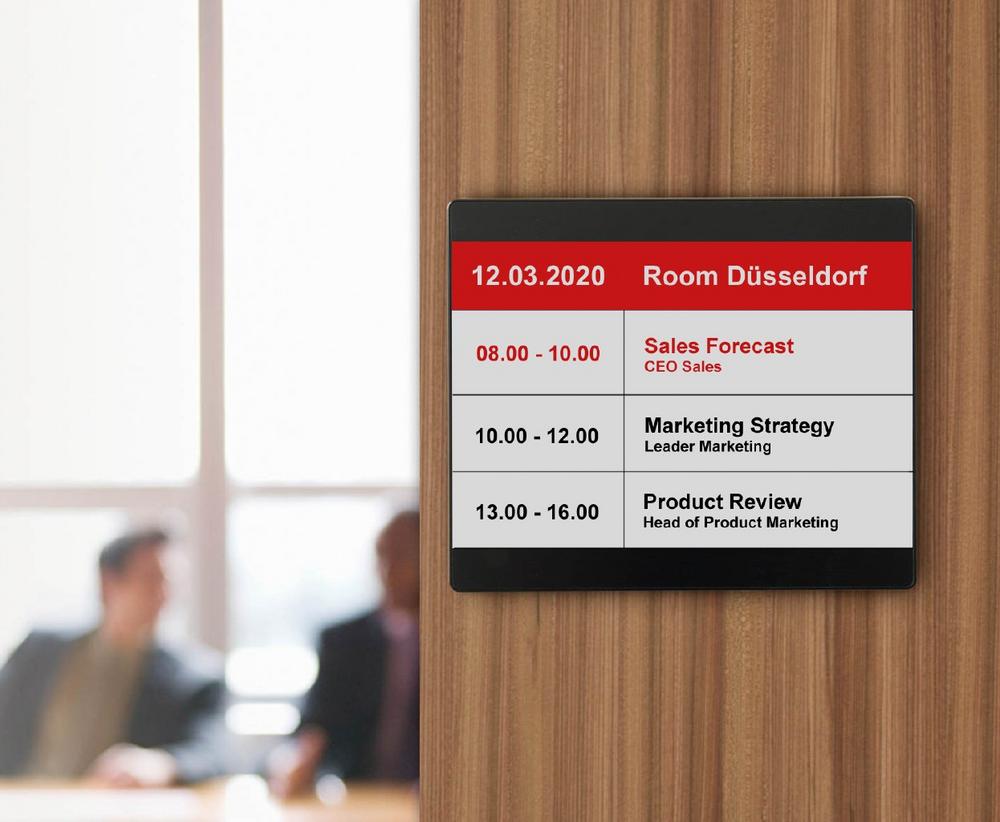The electronic ink system of the black and white ePaper consists of negatively charged white particles and positively charged black particles suspended in a clear liquid. When a positive or negative electric field is applied, the corresponding particles migrate to the tip of the microcapsule, where they become visible to the viewer. As a result, the surface appears white or black at this point.
Colored ePaper is available in black, white, and red or yellow. Each microcapsule contains white particles with a negative charge, black particles with a positive charge and red or yellow particles with a positive charge in the transparent liquid. When different voltages are applied, the different color particles are moved into the top layer so that different colors can be seen.
The ePaper Displays (EPD) give the viewer a contrast ratio similar to paper due to the principle of operation. They are opaque due to the reflection principle. This allows 180° readability even in direct sunlight. Front illumination makes them readable even in the dark. ePapers are bi-stable. They only consume power when the display is updated. No power is needed to maintain the image. The power required for updating depends on the size of the display, but is on the order of a few microwatts. This makes this technology ideal for battery-powered and portable solutions.
The limitations of ePaper are the slow refresh rate of the content due to the rearrangement of the particles. Partial refreshing of the image content can fix this problem, but degrades the contrast ratio. Only a full refresh can restore the original contrast ratio. The refresh times for full and partial refreshes can be adjusted individually. However, it should be noted that the faster the refresh, the worse the image quality may become. If the refresh time is too short, the color particles may not fully detach and the image may appear gray. This effect is called "Ghosting". To avoid Ghosting effects, it is recommended to perform a complete refresh after 5 partial refreshes. Partial refreshes are not possible with the 3-color ePaper displays. These generally also have a longer refresh time. Direct exposure to UV light will dry out the ink capsules and cause irreparable damage. Adding sun or UV light blocking films can solve this problem. The slow refresh rate makes it difficult to display animations and video rates. Due to the physical properties of the color film used in the ePaper, only operating temperatures between 0°C and +50°C or -20°C and 30°C for low temperature products can currently be achieved. These temperatures should be maintained especially when updating the screen content. A commonly used solution for higher temperature environments such as outdoors is to implement fans or other cooling features into the application.
Holitech is able to offer a complete set of ePaper solutions through its own research and development team and strategic partnerships. The 35,000 square meter production facility in Asia achieves a monthly manufacturing capacity of 5 million units of ePaper products including module, front light, CTP, full lamination and board as well as other services. Holitech is a strategic partner of E-INK, pioneer and world leader in ePaper technology. Currently, Holitech offers two-color black and white and three-color black-white-red and black-white-yellow ePaper displays. Recently, the first samples of multi-color ePaper displays have been released. These will enter mass production in the first quarter of 2022.
Typical applications of ePaper displays are electronic shelf labels and price tags that can be controlled centrally via a bus system. In the field of Smart Home, Smart Buildings and Smart Metering, ePapers are used to control emergency exits or as displays for room occupancy in meeting rooms or hospitals. They are also frequently used in heating thermostats in the Smart Home sector. EPDs are also used in train stations and public transportation to display passenger information and departure schedules, in e-books, telephones and display advertising.
ePaper usually consists of two substrates and an electronic ink in between, which is composed of tiny particles. The white particles are negatively charged and the black ones positively charged. When a positive or negative electric field is applied, the particles migrate to the tip of the microcapsule, where they become visible to the viewer. As a result, the surface appears white or black at this point.
Typical applications of ePaper displays are electronic shelf labels and price tags. In the field of Smart Home, Smart Buildings and Smart Metering, ePapers are used to control emergency exits or as displays for room occupancy in meeting rooms or hospitals. They are also frequently used in heating thermostats in the Smart Home sector. EPDs are also used in train stations and public transportation to display passenger information and departure schedules, in e-books, telephones and to display advertising.
Holitech is a leader in this technology and offers a complete set of ePaper solutions. The production achieves a monthly manufacturing capacity of 5 million units of ePaper products including module, front light, CTP, full lamination and board as well as other services. Currently, Holitech offers two-color black white and three-color black white red and black white yellow ePaper displays.
#Holitech #ePaper
Holitech Europe GmbH
Klaus-Bungert-Str. 5a
40468 Düsseldorf
Telefon: +49 (211) 9763326-0
Telefax: +49 (211) 9763326-9
http://www.holitech-europe.com
Marcom360
Telefon: +49 (7083) 933745
E-Mail: dgar.huber@marcom360.de
![]()

